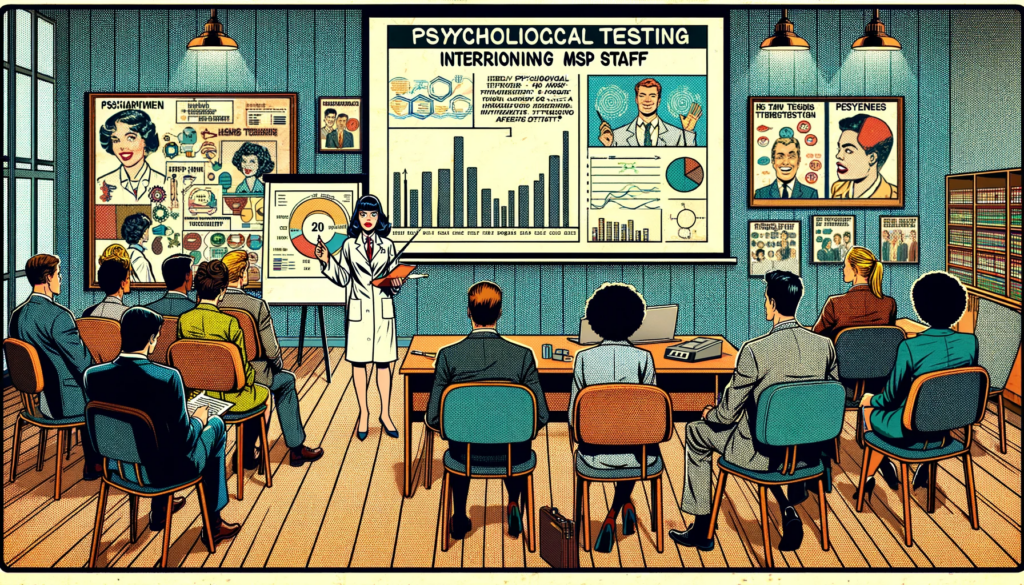At Support Adventure, we’ve always been at the forefront of innovative staffing solutions in the Managed Service Provider (MSP) sector. Inspired by Eric from MSP Mountain’s video, “Why Psychological Testing Isn’t the Best Way to Find Top MSP Talent,” we’re here to share our journey and insights into finding the best MSP talent, moving beyond traditional psychological testing. With hopes that our approach will improve your MSP talent acquisition, here are the challenges with psychological testing:
The Challenge with Psychological Testing
In our experience, psychological testing, while useful in some contexts, often falls short in the dynamic world of MSPs. Here’s why:
- Talent Deterrence: We’ve seen first-hand how requiring psychological tests can turn away top-notch IT professionals. These individuals, often in high demand, may prefer companies that engage more personally right from the start.
- Impersonal Approach: Psychological tests can feel cold and distant. In our world, where personal connection and understanding are key, this approach can seem out of place.
- Mismatch with Real-World Needs: These tests aren’t always tailored to the unique demands of MSP roles. We’ve found that they can overlook the practical, hands-on skills that are crucial in our field.
- Undervaluing Innovation: Ironically, candidates who can ‘game’ these tests often possess the innovative thinking we value in MSPs. Traditional testing methods might misinterpret these traits as negatives.

Our Approach to Talent Acquisition
At Support Adventure, we’ve developed a more holistic approach to hiring. Here’s what we focus on:
- Conversational Interviews: We believe in the power of conversation. Our interviews are more than just Q&A sessions; they’re opportunities to connect on a human level, understand a candidate’s passions, and gauge cultural fit.
- Practical Skill Assessments: We’ve set up real-world scenarios to test technical abilities. It’s not just about what candidates know; it’s about how they apply their knowledge.
- Cultural Fit and Company Values: We’re proud of our company culture, and we want our new hires to be a part of it. We look for individuals who share our values and vision.
- Trial Periods and Shadowing: There’s no better way to understand a candidate’s fit than to see them in action. We offer trial periods where candidates work alongside our teams, giving both sides a chance to assess compatibility.
- Diverse Hiring Criteria: We recognize the diversity in skill sets and personalities in the MSP space. Our hiring criteria are broad, ensuring we don’t miss out on unconventional but brilliant talent.
The Impact of Our Approach in Testing IT Staff
Since adopting this approach, we’ve seen remarkable improvements:
- Enhanced Team Dynamics: Our teams are more cohesive and collaborative, thanks to our focus on cultural fit.
- Increased Innovation: By valuing practical skills and innovative thinking, we’ve fostered an environment where new ideas thrive.
- Higher Employee Satisfaction: Our staff feels valued and understood, leading to higher job satisfaction and lower turnover rates.
Real-Life Examples from Our Experience
Let’s talk about some real-life scenarios we’ve encountered at Support Adventure:
- Case Study 1: We once had a candidate who didn’t do well on a psychological test but excelled in our practical assessments. This individual turned out to be one of our most innovative problem-solvers.
- Case Study 2: In another instance, a candidate’s conversational interview revealed a deep alignment with our core values, something a psychological test could never have uncovered.
At Support Adventure, we’re not just filling positions; we’re building a community of passionate, skilled, and innovative MSP professionals. Our journey beyond psychological testing has taught us the importance of a more human-centric approach to talent acquisition. We believe this is the key to success in the MSP industry.
| Pros of Psychological Testing in Hiring | Cons of Psychological Testing in Hiring |
| Objective Assessment: Provides a standardized way to evaluate candidates, reducing personal biases in the hiring process. | Limited Scope: May not capture all the necessary skills and attributes required for a specific job role. |
| Predictive Insights: Can offer predictive data about a candidate’s potential job performance and suitability for the role. | Potential for Misinterpretation: Results can be misunderstood or misapplied if not interpreted by qualified professionals. |
| Consistency: Ensures a consistent approach to evaluating candidates, which is particularly useful when hiring at scale. | Cost and Time: Developing, administering, and analyzing tests can be time-consuming and costly. |
| Identification of Traits: Helps in identifying specific psychological traits and cognitive abilities relevant to job performance. | Cultural Bias: Some tests may contain cultural biases, leading to unfair disadvantages for certain groups of candidates. |
| Complements Other Methods: Works well in conjunction with other hiring tools like interviews and practical assessments. | Candidate Experience: May be off-putting or stressful for candidates, potentially affecting their performance or perception of the company. |
| Reduces Turnover: By better matching candidates to job requirements, it can lead to lower employee turnover. | Legal and Ethical Concerns: Improper use of tests can lead to legal challenges and ethical issues, especially if they are discriminatory. |

American Psychological Association (APA) on Psychological Testing
Several resources from the American Psychological Association (APA) discuss the effectiveness of psychological testing in hiring practices. These resources provide data-driven research and insights into the use of psychological assessments in the context of employment. Here are some of the key findings and their respective links:
- Using Practice Employment Tests to Improve Recruitment and Personnel Selection:
- This study examines the use of practice employment tests, including assessments of occupation-specific knowledge and English writing skills, as tools to improve recruitment outcomes.
- Read the study here
- Psychological Testing for Selection Purposes: A Guide to Evidence-Based Practice:
- This review provides evidence on the use of psychological testing for selection purposes, highlighting the importance of being informed about best practices in recruitment and selection.
- Access the guide here
- Using Practice Employment Tests to Improve Recruitment and Personnel Selection:
- This research introduces the use of practice employment tests during recruitment as a tool to improve outcomes for both organizations and applicants during personnel selection.
- View the research here
- Professional Practice Guidelines for Occupationally Mandated Psychological Evaluations:
- These guidelines discuss the conditions under which psychological assessments may be ordered for employees or applicants, especially in contexts where behavior affects performance and safety.
- Check the guidelines here
- APA Guidelines for Psychological Assessment and Evaluation:
- This document outlines the practice of psychological assessment and evaluation, addressing new areas of practice such as integrated medical care, online assessment, and global initiatives.
- Read the guidelines here
These resources from the APA provide a comprehensive overview of the current understanding and application of psychological testing in hiring and personnel selection, offering valuable insights for organizations considering these methods.

They provide a nuanced view of psychological testing in job interviews and candidate assessment. They do not categorically support or reject the use of psychological testing; rather, they offer insights into how these tests can be effectively used and the considerations that need to be taken into account.
Here’s a summary of the American Psychological Association’s stance:
- Effectiveness in Certain Contexts: The studies acknowledge that psychological testing can be effective in certain contexts, particularly when assessing specific skills or competencies that are directly relevant to the job.
- Importance of Best Practices: The emphasis is on the importance of following evidence-based best practices in the use of psychological tests. This includes choosing tests that are scientifically validated and relevant to the specific job requirements.
- Not a Standalone Tool: The resources suggest that psychological tests should not be the sole criterion for candidate assessment. They are most effective when used as part of a broader, holistic approach to candidate evaluation that includes interviews, practical skill assessments, and other methods.
- Consideration of Job-Specific Requirements: The appropriateness of psychological testing depends on the specific requirements of the job. For some roles, these tests can provide valuable insights into a candidate’s suitability; for others, they may be less relevant.
- Ethical and Professional Guidelines: The use of psychological testing must adhere to ethical and professional guidelines to ensure fairness and avoid potential biases or discrimination.

In summary, these APA resources suggest that while psychological testing can be a valuable tool in certain hiring scenarios, it should be used judiciously, as part of a comprehensive assessment strategy, and in line with best practices and ethical standards. They neither fully endorse nor completely dismiss psychological testing, but rather advocate for its careful and informed application.
Testing and Training MSP Staff: Best Practices
Testing and training Managed Service Provider (MSP) staff effectively is crucial for the success and growth of any MSP business. Best practices in this area involve a careful blend of rigorous selection processes and comprehensive training programs. For instance, finding and hiring the best MSP technicians requires a nuanced understanding of the specific skills and attributes that make an individual successful in this role (Support Adventure). Similarly, ongoing training for MSP IT staff is vital to ensure they remain up-to-date with the latest technologies and practices, as outlined in MSP IT Staff Training Best Practices. The global nature of today’s workforce also means considering international hiring, which brings its own set of challenges and opportunities as discussed in How Can a US Company Hire a Remote Employee in Another Country?
Additionally, hiring for specific technical roles, such as IT Level 3 Technicians, requires a more specialized approach, which can be found in resources like How to Hire IT Level 3 Technicians. Moreover, the trend towards remote work has prompted many MSPs to consider how to effectively hire and manage remote staff, a topic comprehensively covered in Hire Remote Staff MSP and MSP Job Interview.
At Support Adventure, we understand the unique challenges faced by MSPs in sourcing, hiring, and managing top talent. Our expertise lies in assisting MSPs to find the best talent, hire effectively, and manage their teams efficiently, all at a cost that is competitive and value-driven.
If you are looking for the best remote technicians for your help desk, our MSP staffing solutions focus on staffing vetted Level 1-3 IT Help Desk Technicians and Service Desk Coordinators for your MSP.
With our guidance and support, MSPs can expect enhanced performance, reduced overhead, and ultimately, a more successful and sustainable business model. Feel free to reach out to us!



0 Comments